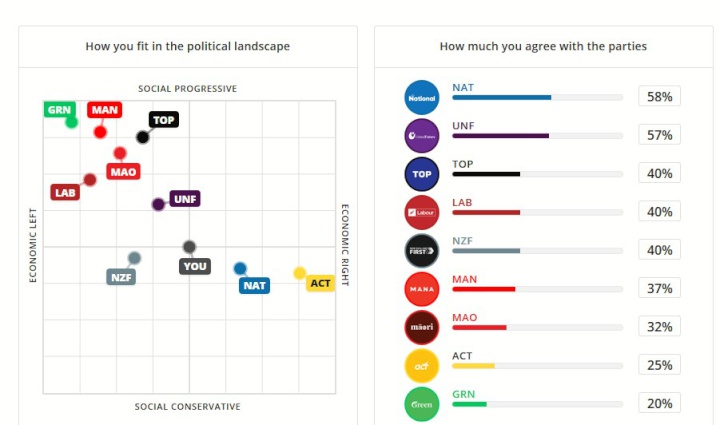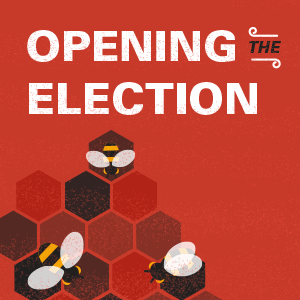Capturing party intentions: Spinoff’s POLICY
tool.
Byline:
Opening the election
The
SpinOff’s initiative Policy launched recently and is
a resource for undecided voters in the September election.
Scoop has a role in this project as content partner. Our
database of party political stories, speeches and press
releases coupled with a powerful search engine means that,
Scoop is the most reliable and complete source for this
information in New Zealand. We are proud to be involved with
a positive initiative to get people thinking about
policy.
MāAll of the SpinOff’s statements summarising party policies are referenced back to actual articles speeches or media statements. It’s an impressive piece of work and hopefully serves to inspire intending young voters looking for policy information. The website is well designed and fully responsive. There were some surprises for me when I used it. “How had I missed that policy?” On more than one occasion a strong desire for a “don’t like” as well as a “like”: button! I was surprised at my choices finding options from across a wide spectrum of parties that appealed.
The project is by far the best of the offerings to the public to support election decision making by matching preferences to policy positions. It covers 10 major topic areas from Housing and Education to Te Ao Māori and each is divided into subtopics. So for example Environment has three subtopics – water, climate change and conservation. Up to 5 of each party’s policies are outlined in simple pithy statements. If you dig deeper you can see an explanation of the policy and information about the proposed implementation, supported by the references to published content of the party website. The young people who approached the SpinOff with the idea have done an impressive amount of work and the design is smart and, after a minute or two’s experimentation with the left and right navigation for the topics and subtopics, intuitive. As an example I found that the whole complex and contested area of social welfare is presented under three headings. Incomes has information on benefits, superannuation and income support - and under the housing heading are the issues of affordability, rental and healthy housing with information on mental health under the health section. The site is being updated with new policies as they are announced through to the election.
Policy avoids most of the problems with other voting advice systems like the Vote Compass, and Massey Universities On The Fence also launched for the election. Sites like these that take measurements via values questions and then map them to party preferences. You have to trust that the designers have encoded the value statements accurately against the party policies and there is some evidence that this is not always the case. In both the NZ designed voting systems if you are less decisive – which may arguably be the situation for new voters – the systems provide results that are likely to be skewed towards the National Party and for the Green Party to be the least favoured. With Policy this is all transparent and open to correction. In fact the designers ask for feedback and corrections.

Notwithstanding that there are a few issues to be aware of. Five policies is too many for some sub-topics and too few for others and there has been an honest and earnest attempt to filter the most important ones in. Sometimes the policies don’t seem to be ‘like for like’ but the designers have had to work with the politicians sometimes lumpy presentation of new policy that is sometimes mundane and at other times transformational. There is no topic of trade or international relations yet both are pretty important and with the TPPA and other trade deals looming and an increasingly complex and fractious world situation this would be a useful inclusion.
Finally there are some other broader issues which mean that despite the usefulness of Policy to compare parties you do really need to know more. If you don’t also understand something of the DNA of the party you appear to agree with you might not be well placed to discover what each might actually do in power. By way of example there is now little difference between the 2 biggest parties on parental leave at 22 and 26 weeks. However the National Party’s focus on personal responsibility and the role of the family as the cornerstone of society contains a thousand coded messages about why it does what it does in power no less than Labour’s core values of collectivism and universality of provision determine how it will act in government. Essentially what this means is that additional self- education and a willingness to engage with political ideas beyond a single tool that is transparent is necessary to prevent voter’s remorse.



 Binoy Kampmark: Euphemistic Practices - The IDF, Killing Aid Workers And Self-Investigation
Binoy Kampmark: Euphemistic Practices - The IDF, Killing Aid Workers And Self-Investigation Gordon Campbell: On The Left’s Electability Crisis, And The Abundance Ecotopia
Gordon Campbell: On The Left’s Electability Crisis, And The Abundance Ecotopia Ramzy Baroud: French Contradictions | Macron's Palestine Play - Too Little, Too Late?
Ramzy Baroud: French Contradictions | Macron's Palestine Play - Too Little, Too Late? Martin LeFevre - Meditations: Easter Reflections
Martin LeFevre - Meditations: Easter Reflections Binoy Kampmark: Dotty And Cretinous - Reviewing AUKUS
Binoy Kampmark: Dotty And Cretinous - Reviewing AUKUS Ramzy Baroud: Beneath The Surface - Is The Trump-Netanyahu 'Unthinkable' About To Erupt?
Ramzy Baroud: Beneath The Surface - Is The Trump-Netanyahu 'Unthinkable' About To Erupt?